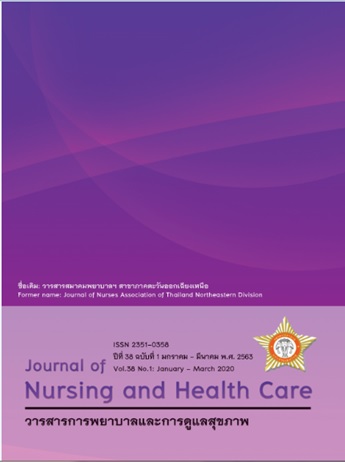การพัฒนาโปรแกรมให้ความรู้เพื่อปรับเปลี่ยนพฤติกรรมที่ส่งผลต่อระดับน้ำตาลสะสมในเลือด (HbA1c) ของผู้ป่วยเบาหวานชนิดที่ 2 โรงพยาบาลยโสธร
คำสำคัญ:
โปรแกรมให้ความรู้, พฤติกรรมสุขภาพบทคัดย่อ
บทคัดย่อ
การวิจัยเชิงปฏิบัติการแบบมีส่วนร่วมครั้งนี้มีวัตถุประสงค์เพื่อพัฒนาโปรแกรมให้ความรู้เพื่อการปรับเปลี่ยนพฤติกรรมการดูแลตนเองของผู้ป่วยเบาหวานชนิดที่ 2 โดยผู้มีส่วนร่วมในการวิจัยประกอบด้วยบุคลากรสุขภาพสหสาขาวิชาชีพที่เกี่ยวข้องกับการดูแลผู้ป่วยเบาหวาน ผู้ป่วยและผู้ดูแล มีขั้นตอนดำเนินการแบ่งออกเป็น 3 ระยะ คือ ระยะที่ 1 ศึกษาข้อมูลพื้นฐานและวิเคราะห์สถานการณ์ ระยะที่ 2 ระยะปฏิบัติการ ซึ่งประกอบด้วย 4 ขั้นตอนย่อยดังนี้ ก.การวางแผน ข.ปฏิบัติการและสังเกต ค.สะท้อนผลการปฏิบัติ ง.ปรับปรุงแผน ดำเนินการเป็น 2 วงรอบ ในวงรอบที่ 1 ผู้วิจัย ทีมบุคลากรสหาขาวิชาชีพ ผู้ป่วย มีความรู้ความเข้าใจมีการเปลี่ยนแปลงพฤติกรรมสุขภาพที่ดีขึ้น สำหรับวงรอบที่ 2 ได้นำผู้ดูแลผู้ป่วยเบาหวานเข้าร่วม จากการสังเกตและสะท้อนผล พบว่า ผู้ดูแลผู้ป่วยมีการรับรู้และตื่นตัวในการสนับสนุนให้เกิดการปรับเปลี่ยนพฤติกรรมในทางที่ดี การวิจัยครั้งนี้ใช้ในกลุ่มทดลองกลุ่มตัวอย่างและกลุ่มควบคุม กลุ่มละ 34 คน ซึ่งได้มาจากการสุ่มตัวอย่างแบบง่าย กลุ่มทดลองได้เข้าร่วมโปรแกรม จำนวน 5 ครั้ง ครั้งละ 6 ชั่วโมง ห่างกันทุก 4 สัปดาห์ รวมระยะเวลา 5 เดือน ส่วนกลุ่มควบคุมได้รับการบริการสุขภาพตามปกติ และระยะที่ 3 ระยะประเมินผลพบว่า หลังการใช้โปรแกรมที่พัฒนาขึ้น 3 เดือน ค่าเฉลี่ยของน้ำตาลสะสมในเลือด (HbA1c) ของผู้ป่วยเบาหวานกลุ่มทดลอง ( = 8.42, S.D.= 0.56 ) น้อยกว่ากลุ่มควบคุม (
=8.82, S.D. = 0.52) อย่างมีนัยสำคัญ ( p-value < 0.05) การวิจัยครั้งนี้ทำให้ได้โปรแกรมให้ความรู้เพื่อการปรับเปลี่ยนพฤติกรรม ที่มีประโยชน์ต่อการปรับเปลี่ยนพฤติกรรมสามารถส่งผลให้ระดับน้ำตาลสะสมในเลือดลดลง
Abstract
The purpose of this participatory action research was to develop an educational program for behavior modification in self-care of type 2 diabetic patients. Participants in this study consisted of multidisciplinary health personnel involved in Diabetic care patient and caregiver There are steps to be divided into 3 phases, which are Phase 1, study basic information and analyze the situation. Phase 2 Operation Which consists of 4 sub-steps as follows: A. Planning B. Operation and observation C. Reflect the results of the operation D. Improve the plan Performed in 2 cycles. In cycle 1, the researcher, staff members, professional careers, patients have better understanding and health behavior change. For the 2nd round, participants of the diabetic caregivers Observing and reflecting the results, it was found that caregivers perceived and were alert to support behavior modification in a good way. This research was used in the experimental group, sample group, and control group, each of 34 persons which was obtained by simple random sampling. The experimental group participated in the program 5 times, 6 hours each time, 4 weeks apart, for a total of 5 months. The control group received regular health services and Phase 3 evaluation periods showed that After using the developed program for 3 months, the mean blood glucose level (HbA1c) of the experimental group diabetic patients ( = 8.42, SD = 0.56) was less than the control group (
= 8.82, SD = 0.52). Significantly (p-value <0.05), this research provided an education program for behavior modification. That is beneficial for behavior modification can result in lower blood sugar levels



